Bioethicist Founding Father Daniel Callahan has long supported death panel health care rationing based on age. He has now weighed in against spending a lot on research to delay the aging process.
The transhumanists aren’t going to like this! From, “On Dying After Your Time:”
Even if anti-aging research could give us radically longer lives someday, though, should we even be seeking them? Regardless of what science makes possible, or what individual people want, aging is a public issue with social consequences, and these must be thought through.
Regardless of what science makes possible, or what individual people want, aging is a public issue with social consequences, and these must be thought through. Consider how dire the cost projections for Medicare already are. In 2010 more than 40 million Americans were over 65. In 2030 there will be slightly more than 72 million, and in 2050 more than 83 million. The Congressional Budget Office has projected a rise of Medicare expenditures to 5.8 percent of gross domestic product in 2038 from 3.5 percent today, a burden often declared unsustainable.
 Contrary to the transhumanist eschatology, Callahan doesn’t believe that extending the length of lives will also mean extending their vitality. I tend to agree. But he doesn’t exactly practice what he preaches:
Contrary to the transhumanist eschatology, Callahan doesn’t believe that extending the length of lives will also mean extending their vitality. I tend to agree. But he doesn’t exactly practice what he preaches:
Modern medicine is very good at keeping elderly people with chronic diseases expensively alive. At 83, I’m a good example. I’m on oxygen at night for emphysema, and three years ago I needed a seven-hour emergency heart operation to save my life. Just 10 percent of the population — mainly the elderly — consumes about 80 percent of health care expenditures, primarily on expensive chronic illnesses and end-of-life costs. Historically, the longer lives that medical advances have given us have run exactly parallel to the increase in chronic illness and the explosion in costs. Can we possibly afford to live even longer — much less radically longer?
Callahan could have refused that expensive treatment. I don’t say he should have, but no one forced him to spend all that (presumably) public money on care.
He does ask a valid question, I think, about the wisdom of pouring resources into radical life-extending research (at least public money). However he also seems to assert that the elderly be somehow prevented from living longer (my emphasis):
We may properly hope that scientific advances help ensure, with ever greater reliability, that young people manage to become old people. We are not, however, obliged to help the old become indefinitely older. Indeed, our duty may be just the reverse: to let death have its day.
What does that mean? Some kind of Logan’s Run scenario?
Callahan isn’t that type. But he should have specified what he meant. As I read him, he seems to be proclaiming some kind of a moral duty of the elderly to die.
CLICK LIKE IF YOU’RE PRO-LIFE!
Or it could mean refusing efficacious medical care to the elderly that the younger would be able to obtain. In less genteel hands than Callahan’s, it could mean something even more insidious.
My, don’t those clouds on the horizon look dark?
LifeNews.com Note: Wesley J. Smith, J.D., is a special consultant to the Center for Bioethics and Culture and a bioethics attorney who blogs at Human Exeptionalism.







